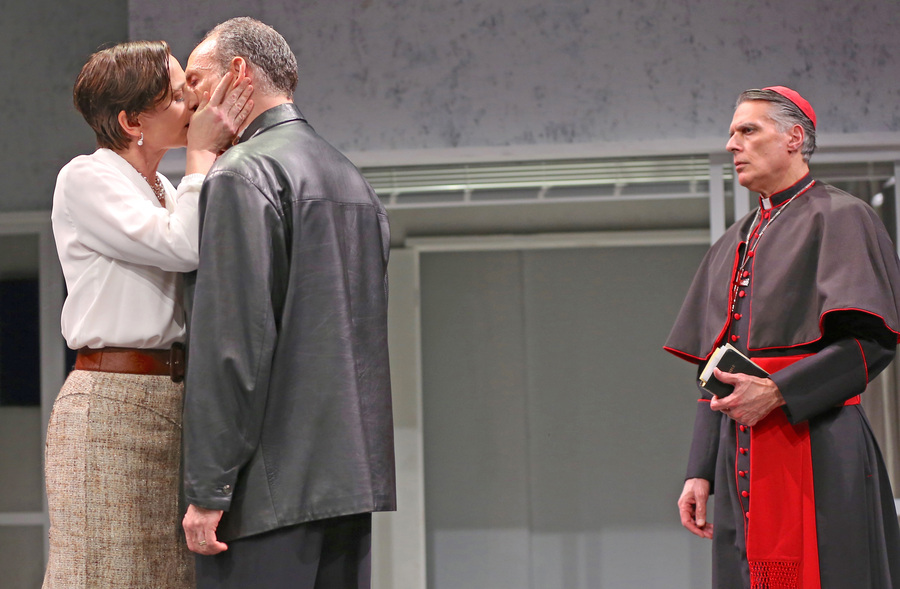When John Douglas Thompson first heard that Jesse Berger intended to start a theatre company dedicated to Jacobean drama, the actor recalls, “I thought, C’mon, man: You’re going to last as long as your first production!”
On the contrary, 17 years after Berger founded Red Bull Theater with a credit card and three friends to sign the 501(c)(3) paperwork, the New York City company boasts a formidable track record of 20 full productions and 150-plus staged readings in its Obie-winning Revelation Readings series. Named for a Jacobean playhouse that illegally performed plays in England during the years of Puritan rule, Red Bull has built a well-deserved reputation as a fearless interpreter of seldom-seen classics. From Thomas Middleton’s A Chaste Maid in Cheapside in 2003 to John Webster’s The White Devil in 2019, it has given the Jacobeans a contemporary edge without scanting their 17th-century particulars—indeed, the Jacobeans’ cynical take on a corrupt society plays very well in the 21st century. The company draws on a cadre of committed actors who speak the tricky verse in an assured, unfussy fashion that might be called the Red Bull house style.
Thompson rethought his skepticism after seeing early productions like The Revenger’s Tragedy. “I realized this was a company to be reckoned with, and I wanted to work with them,” he says. He joined Red Bull’s fourth production, Middleton’s Women Beware Women, in 2008.
Up next is Ben Jonson’s The Alchemist, freely adapted by Jeffrey Hatcher and directed by Berger. (The show, originally scheduled for May/June, has been postponed.) The show would cap a wide-ranging Red Bull season. It began in August with American Moor, author/actor Keith Hamilton Cobb’s meditation on his ambivalent relationship with Othello. Among the Revelation Readings were Beaumont and Fletcher’s Love Lies a-Bleeding; Kate Hamill’s adaptation of The Scarlet Letter; and Berger’s of Women Beware Women. In January, Red Bull’s spring 2019 production, a high-concept, all-female Mac Beth adapted and directed by Erica Schmidt, was revived at the Hunter Theatre Project.
Anyone who thinks this eclectic, not-strictly-Jacobean slate signals a change in Red Bull’s focus will be swiftly corrected by its artistic director. Berger founded the company, he says, both because he felt the Jacobeans were neglected by other companies and because even those that produced them didn’t have the focus on language that was important to him.

“The Jacobeans are central to the ethos of the company,” Jesse Berger insists. “But I was always interested in other plays of heightened language. In the beginning, when I could only get together a production every year or so, I wanted to stay at the core with the Jacobeans. But if you look back at the first readings series in 2003, there was already the idea that the company’s mission could include other rarely produced classics of world drama, like Gogol and Schiller, a breadth of adaptations, new plays inspired by the classics, and writers who seemed Jacobean in spirit, like Joe Orton and Jean Genet.”
Indeed, The Maids marked Red Bull’s first departure, in 2012, and Loot followed two years later. In 2017, Gogol’s The Government Inspector, Berger’s first collaboration with Hatcher, was Red Bull’s biggest hit to date. He hopes to give Schiller’s Don Carlos a full production soon.
Berger’s depth of theatrical knowledge would be intimidating if he weren’t such a low-key, affable guy, and his ability to share this expertise without intimidating anyone is one of the things actors prize about him. “Many actors come to this kind of work not quite knowing who these characters are, or the ideas behind the characters, or the origin story of the playwright, or why these plays were written,” says Thompson (who is emphatically not one of those actors). “Jesse’s an encyclopedia on these things, and he’s passionate about them.”
“I’ve got better at being selective and not overwhelming everyone,” Berger says. “I used to give very long speeches at first rehearsal, probably too much. When I had an internship at the Guthrie, I was inspired by [then artistic director] Garland Wright, who would read these 20- to 30-minute speeches at first rehearsal, brilliant discussions of the why.”
His other great mentor, he says, was Michael Kahn, longtime artistic director of the Shakespeare Theatre Company in Washington, D.C. “Michael was the diametrical opposite of Garland in that first rehearsal speech: eloquent, witty, and charmingly off the cuff, but much more ‘brevity is the soul of wit,’” Berger recalls. Synthesizing the two models, he says, “They both helped me realize that part of your job as a director is to inspire your collaborators and get everyone on board with the themes you’re trying to underline in your production. They were important as lodestars, but I think I’ve let go and allowed myself to be me.”
“Jesse is just an easy person,” comments Charlayne Woodard, whom Berger enlisted for the title role of The Witch of Edmonton in 2010. She was one of those actors who knew little about the Jacobeans, she says, but “he didn’t force his vision of the play onto us; once you got up from the table you could just feel it out yourself, walk around, and connect with each other. That’s what I love about Red Bull: We don’t all know the show, so let’s come and have a new adventure. And it’s coming from us here, in the 21st century; we were wearing period clothes in The Witch of Edmonton, but it felt real and current.”
“I prefer to let audiences find the allegories on their own,” comments Berger, whose productions thus far have eschewed modern dress. “But I think the actors like to know, and I need to know, why we are doing the play—not just when it was written, but what was the context when it was written, and why did I choose to do it now? We try to keep our eye on what’s going on in the world and see where it matches up with our mission.”

The Alchemist is no exception. “With our current crop of political leaders, cronies, and capitalism seemingly run amok, now is a great time to examine the ludicrous contortions people will put themselves through in order to come out on top,” Berger says. “For me the heart of The Alchemist is about the ‘alchemy’ people do to themselves in pursuit of greed or other ambitions that are either not concomitant with their true character or are immoral, amoral, or unethical. Watching people make fools of themselves as they seek to become what they should not become, to attain what they ought not have, to master what they cannot control—that’s the stuff of comedy.” Berger stops himself here to add that this “probably all sounds too heady for a play that is Noises Off crossed with Dirty Rotten Scoundrels.”
Speaking several months before The Alchemist was slated to open, Berger underscores that these are simply preliminary thoughts. “Sometimes you find out what’s most topical about a play when you get into rehearsal—you say, ‘Oh, I thought it was this, but actually it’s this!’—and that’s exciting. Other times, the topicality leads you to the play. I’m thinking about The Jew of Malta right now, because of the bigotry that’s been laid bare in our society in terms of anti-Semitism and hate crimes in general. We’re going to do a reading and see if we want to do it.”
Christopher Marlowe’s notorious play, featuring a Jewish villain far less sympathetic than Shakespeare’s Shylock, is a scary choice, I observe. “That might be one of the reasons to do it,” Berger replies. “We try to be brave at Red Bull. Bob Woodruff [then artistic director of the American Repertory Theater] gave me a piece of advice that has stuck with me: ‘If it doesn’t scare you, don’t do it.’ That’s one of my mantras, in terms of keeping us on our toes and making sure we’re not playing it safe. If you think you know how to do a play, if it doesn’t frighten you in some way, then maybe you’ve already done that and you should try something else that scares you—like The Jew of Malta.”
He’s grown braver over the years, says Berger, pointing to Mac Beth as “a production I would have been very scared to do 10 years ago.” In Erica Schmidt’s adaptation, a cast of young women dressed as schoolgirls stage a performance of Shakespeare’s Macbeth that leads to the murder of a classmate. You might not want this to be someone’s first Macbeth, I remark to Berger, but it’s a bracing revision.
“People had very strong opinions about that production,” he recalls. “I’m proud we did it; I think Erica delivered superbly on her vision. One of the ways Red Bull is better and stronger now is that we have room for more aesthetic voices and choices. We can find new audiences and bring along our core audience—some will hate it, some will love it, but we’re in an exciting conversation, and the more we’re able to produce, the more voices we’re able to include, the more exciting it will be.”
For the 10th annual anniversary of the company’s short new play festival, Red Bull commissioned short works by Jeremy O. Harris and Theresa Rebeck to headline a July 20 performance that will also include six plays selected from submissions on the theme “Private Lives.” The company is able to give more commissions now, and, thanks in part to Berger’s years at the Guthrie and the Shakespeare Theatre, is well connected to a network of likeminded regional and classical theatres with which Red Bull shares scripts—“and competes to get the next Kate Hamill play first!”
Commissions, new voices, and expanding programs require more fundraising, and Red Bull did its share this past season. On Oct. 21, 2019 the annual kickoff fundraiser featured Red Bull regulars Patrick Page and Mary Testa in Return to the Forbidden Planet, a rock ’n’ roll mash-up of The Tempest that filled Symphony Space with the company’s largest single-night audience ever. In February, Page gave a sold-out benefit performance of his one-man exploration of Shakespeare’s villains, All the Devils Are Here.
“The challenge is to figure out ways to raise money that are mission-based and feel like more than just selling another ticket,” says Red Bull managing director Jim Bredeson. “What we are seeking to do is really make a community realize that it is a community. There is an audience for the kind of work we do—accessible, energized, and for today—but we’re at a turning point. Can we institutionalize, become a mainstay of New York’s theatre scene? Or will Red Bull always be a boutique? Boutique is not wrong, but none of the New York theatre mega-institutions are doing the work we are. The hard question is: how exponential is this audience? In the next two years, if we get the tools and resources we need, we’ll find out more.”
Muses Berger, “It’s easier than it was when it was me in my living room saying, ‘Should I have a theatre company? How am I going to do it? Can I get some friends to come over and lick stamps?’ But it’s still a lot of work and there are just as many challenges. My ambitions have always been a little bit bigger than where we are.”
Whether or not the Red Bull Theater ever becomes a New York City “mega-institution” on the scale of the Roundabout or the Signature, it seems likely that Jesse Berger’s ambitions for his company will continue to grow.
Wendy Smith is a frequent contributor to this magazine.
Production credits for images: Mac Beth by Shakespeare. Adaptation and direction: Erica Schmidt; sets: Catherine Cornell; costumes: Jessica Pabst; lighting: Jeff Croiter; sound: Erin Bednarz; movement: Lorenzo Pisoni. The White Devil by John Webster. Direction: Louisa Proske; sets: Kate Noll; costumes: Beth Goldenberg; lighting: JiYoun Chang; sound and music: Chad Raines; video: Yana Birÿkova.


